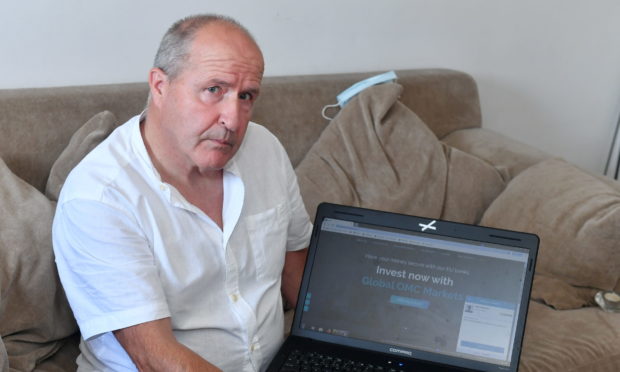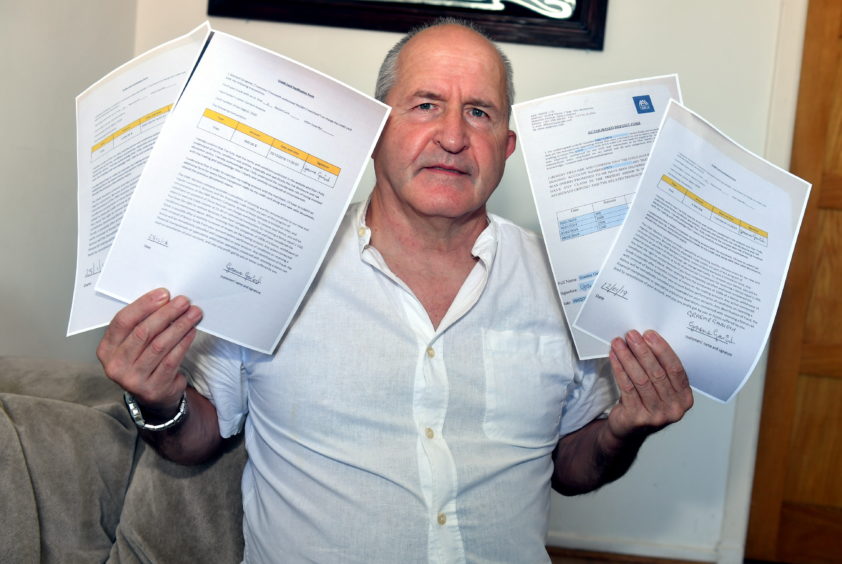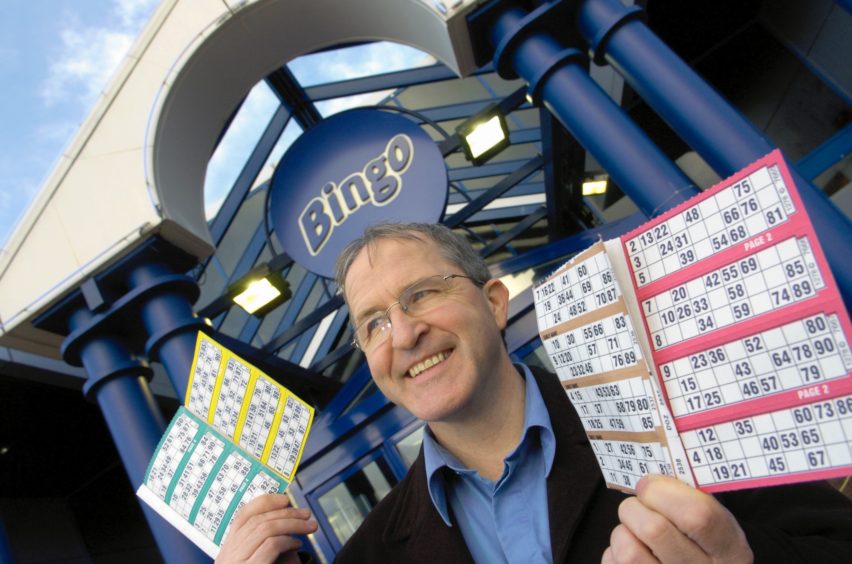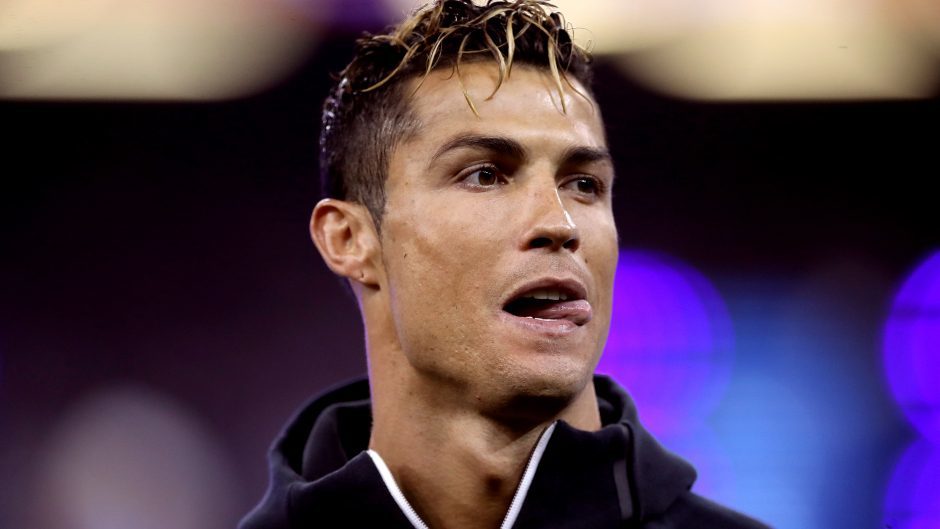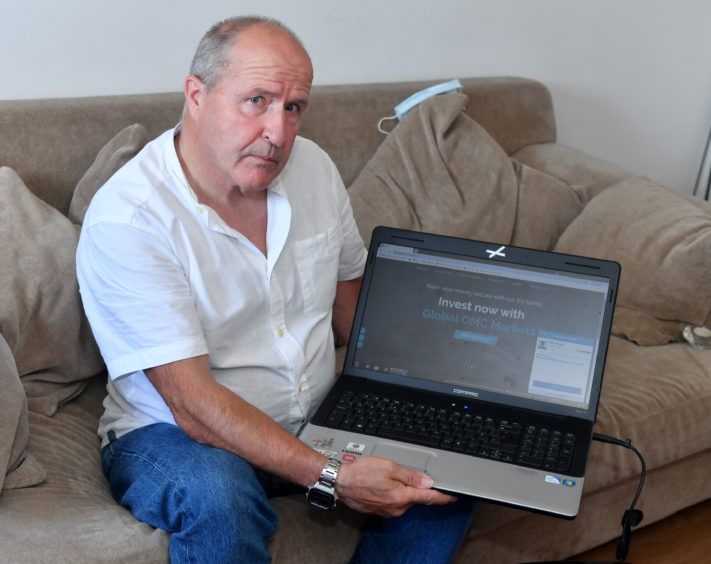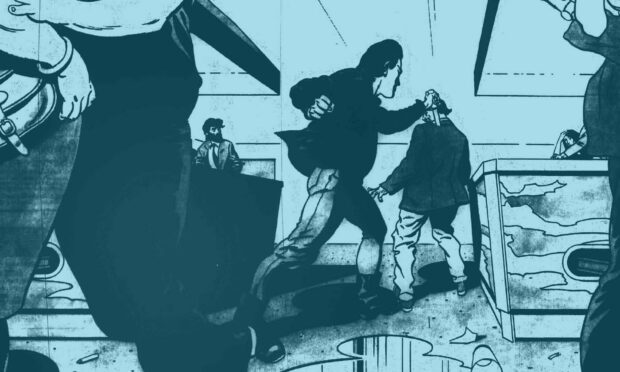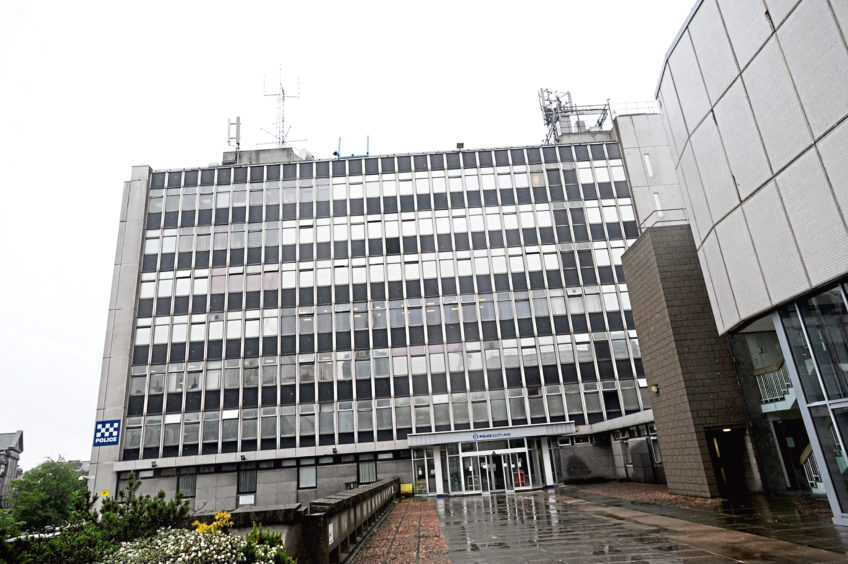A Deal or No Deal winner was targeted by international fraudsters in a cryptocurrency scam.
Graeme Garioch made the headlines in 2007 when he took home a £101,000 prize on the popular gameshow – but he has now told of how scammers exploited Facebook and footballer Cristiano Ronaldo to take his nest egg and delay his retirement.
As part of our in-depth investigation into fraud in the region, we can reveal 73 north-east residents have lost a total of £3,224,752.98 in investment scams in the last year – almost treble the amount taken in the same period 12 months earlier.
Between August 2018 and July 2019 there were 42 such incidents, in which a total of £1,213,553.07 was taken.
One of the guys I know mentioned he was into bitcoin and said he was living the high life from it”
Graeme, of Cove, lost almost £30,000 – and has backed a police campaign urging people not to go down the same path.
The 65-year-old worked for many years as a bingo caller at Mecca Bingo in Aberdeen and said he was delighted to have beaten the banker on the Channel 4 show.
In October 2018, with his retirement on the horizon, Graeme wanted to invest some of his cash and found a way of doing so while scrolling on Facebook one day, using bitcoin, a cryptocurrency that has become popular, partly because it is not controlled by any national bank.
Graeme, a dad of one, said: “I had invested with Aberdein Considine before, and all that went fine.
“In 2018, bitcoin was becoming quite big. One of the guys I know mentioned he was into bitcoin and said he was living the high life from it, so I thought it might be an opportunity and then I saw something on Facebook.”
Companies can pay the social-media platform to place ads only on profiles of people with certain characteristics or interests, such as people close to retirement age or those who have searched for investments.
One ‘company’, OMC Markets, placed an ad that resembled a newspaper article in The Mirror.
It showed a picture of Juventus star Cristiano Ronaldo being interviewed by Jonathan Ross, seemingly about bitcoin.
The photograph was genuine but the conversation between the TV host and the footballer never discussed investment.
However, the fake article described how the world-renowned footballer wanted to “open the gates to wealth to all his fans in the UK”.
It said Ronaldo had created an investment opportunity to create millionaires but “you have to act fast. The spots for applying are limited.”
Graeme clicked on the link, filled out a form – and within two hours got a phone call from a man claiming to be Daniel Hardy, of London. Unbeknownst to Graeme at the time, it was in fact an unknown scammer calling from Sofia in Bulgaria.
Graeme said: “Daniel said I could get a bitcoin for as cheap as £100.” The current value of one bitcoin is £8,677.
Daniel told Graeme to open a bitcoin wallet online and deposit funds from his bank account.
Graeme signed a contract which meant that he couldn’t withdraw his funds for six months and – most chillingly – those behind the scam persuaded Graeme to let them access his bank account at any time, telling him it was necessary so they could act on new investment opportunities at short notice.
My bitcoin wallet, which I could view on my laptop, was showing I had made around £11,000 in a few weeks”
Over the course of a few weeks, Graeme invested £5,000.
He said: “My bitcoin wallet, which I could view on my laptop, was showing I had made around £11,000 in a few weeks.
“Daniel was calling me all the time to persuade me to put more money in – every two days.
“I told them I don’t want to put any more in because I was doing well, but this Daniel talked me round. Everything was confident and friendly.
“At one point I said we could meet up in London as my work takes me there and he said no. He said he would never be there when I was there.”
The conmen used clever tricks to part Graeme from his cash.
They convinced him he started off as a ‘bronze’ investor and had risen to become a ‘silver’ customer.
However, if he wanted to become a ‘gold’ or ‘platinum’ investor, he would have to put in more, they told him.
Graeme described how, during one phone call, the fraudsters put on an elaborate show – all for his benefit.
“I was on the phone to Daniel and in the background you would hear roaring.
“I said ‘what’s happened there?’ He said: ‘We’ve just had a guy that’s made a massive profit. I then thought ‘that must be happening to me soon’.”
On another occasion, Daniel drew £5,000 out of Graeme’s bank account, claiming it was to buy a new batch of valuable shares that had become available on the stock market.
Graeme said: “He said ‘tomorrow such a company will release new stocks out for purchase so we need to get into that, so if you can just confirm we can take the £5,000, we’ll do the rest’.
“I would get a message from my bank to say ‘you’ve been requested to do an international trade, are you sure you wish it to happen?’. I said ‘I better just do it’.”
He added: “Eventually, Daniel asked me for another £5,000 and I said ‘this will be the last’.”
That was my pension topped up and I was all set to retire in August 2020.”
Before long, Graeme’s wallet was showing a profit of around £30,000 – his annual salary as a worker on the Caledonian Sleeper trains.
He said: “I was quite happy with that. That was my pension topped up and I was all set to retire in August 2020.”
But then disaster struck. The six-month contract that Graeme had signed with OMC ended in March 2019 and Graeme tried to withdraw his money – but was told he must pay £6,000 to avoid other fees.
A day after Graeme paid the £6,000, all funds disappeared from Graeme’s bitcoin wallet and he couldn’t get hold of anyone at OMC Markets, which has ignored his emails since.
He has lost a total of £29,851.25 and reported it to the police, and his bank, which Graeme has not named.
Graeme was conned just like Deal or No Deal presenter Noel Edmonds, whose business was scammed out of a reported £60m in 2007.
Lloyd Banking Group ended up paying him a reported £5m in compensation in July 2019.
Recalling the events of spring 2019 when he found out about becoming a victim himself, Graeme said: “I made this discovery on April 1, believe it or not.
“You cry inside. I was planning to buy a house but now I’m renting a flat.
“I’ve now got to work another year to make this money back.”
Graeme said: “Afterwards, I found out from researching it that the £6,000 fee they said I had to pay was the fraudsters’ way of getting the last penny from you.
“I do think Facebook needs to do more. My bank must have dealt with other victims and known enough to stop my payments.”
Even 16 months on from the scam, OMC has emailed Graeme this week, trying to get him send personal documentation.
The Financial Conduct Authority has warned on its website about OMC and its activities.
£3.2m is a hell of a lot of money and I really feel for those who have lost it.”
Graeme has joined the police in warning others to be cautious.
He said: “The figures the Press and Journal has uncovered are shocking, and it shows how clever these conmen are. £3.2m is a hell of a lot of money and I really feel for those who have lost it. I feel their pain.
“My warning to people is – anything that looks like it’s too good to be true, is.
“By all means, look into investments, but do your research. Some people go into investments eyes shut. You need to open your eyes. I should have done.”
A Facebook spokesman said: “There’s no place for fraudulent or inauthentic behaviour on Facebook, and we will remove ads and content that violate our policies.
“We continue to invest in people and technology to identify and remove this content, and we urge people to report any suspicious posts to us.
“As part of this work, we have donated £3m to Citizens Advice to deliver a new UK Scam Action Programme and, in June, we launched an industry-wide UK Scam Ad Alert system in partnership with the Advertising Standards Authority to help tackle scam ads further.”
PC Rachel Brown, of Police Scotland’s North East Division, based at Queen Street in Aberdeen, told us that this kind of fraud – with claims of celebrity endorsement – was on the rise in the region.
In one month alone, more than £550,000 was taken from the region in this kind of scam.
She urged people to beware of unsolicited calls from people offering shares and/or investments opportunities.
Genuine companies will not cold call and will not use ‘hard sell’ tactics or try to rush you into a decision to invest.”
PC Rachel Brown
PC Brown added: “I would advise anyone interested in investing in cryptocurrency to do their homework and to only invest if you are confident that you understand the processes and risks.”
“Investment fraudsters will be very knowledgeable and might know about previous investments a person has made.
“People should also be wary of requests to transfer funds to numerous different, or foreign, bank accounts.
“Fraudsters will try to advise you that the return on your investment is guaranteed, quick and virtually risk free, which can never be promised.
“The business address is given as a virtual office at a prestigious address.
“Genuine companies will not cold call and will not use ‘hard sell’ tactics or try to rush you into a decision to invest.”
She encouraged anyone considering transferring funds to first confirm with their bank that they are dealing with a genuine business.
PC Brown added: “As well as this – only ever invest what you can afford to lose.
“Always ensure that the company you are interesting in investing with, is listed on the Financial Conduct Authority website and on Companies House. Be wary of new companies.
“Sometimes fraudulent companies clone the details of genuine companies, so always double check the details with every source that you can find.”
If you or someone you know is at risk of becoming victim of fraud, call Police Scotland on 101 or Crimestoppers on 0800 555 111. Alternatively, you can find more information at www.actionfraud.police.uk
